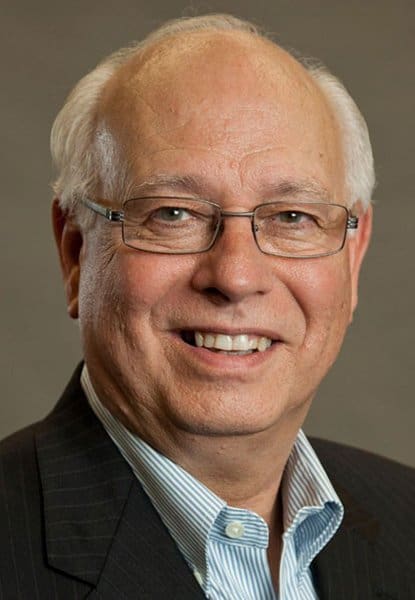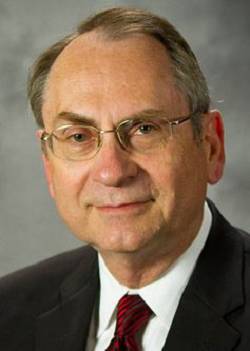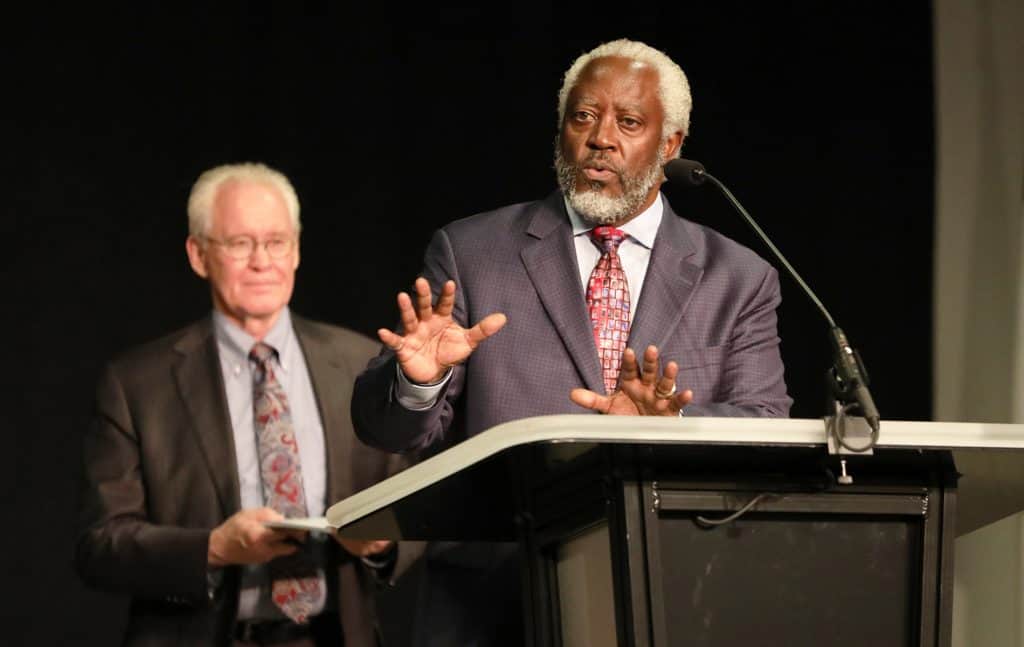New giving plan responds to churches’ concerns about SBC
JEFFERSON CITY – The Missouri Baptist Convention (MBC) Executive Board recently authorized a new “Plan B” method of cooperative giving. The plan allows churches to withhold funds from selected SBC entities without withdrawing from Cooperative Program (CP) support altogether.
“Plan B” comes in response to concerns raised by Missouri Baptist churches and associations about actions taken by some SBC entities – for example, the SBC Executive Committee’s (EC) hasty decision to hire a law firm that promotes LGBTQ+ causes.
The Executive Board’s decision came shortly after officers of the SBC Executive Committee responded to these concerns, as expressed on a national scale, in a letter sent to Southern Baptist state convention executive directors and EC members.
The MBC Executive Board overwhelmingly voted to approve “Plan B” during a special-called Zoom meeting, April 7. During the meeting, MBC leaders described “Plan B” as an attempt to acknowledge Missouri Baptists’ concerns and recognize the autonomy of each church and association.
“Plan A” is the traditional form of Cooperative Program (CP) giving. If churches opt for “Plan A,” their funds will be sent to the SBC’s Executive Committee and distributed according to the allocation plan approved each year by Southern Baptist messengers at their national meeting.
If churches opt for “Plan B” giving, however, they can select which SBC entities to withhold their funds from, and the MBC will forward their gifts only to those SBC entities that are not explicitly excluded by the church.
“The MBC Executive Board continues to forward 38 percent of all CP giving to the SBC, according to our CP allocations budget (Plan A),” MBC Executive Director John Yeats said. “However, giving under Plan B may result in fewer dollars going to the bypassed entities. Plan B dollars are allocated to the remaining SBC entities as indicated by each church.”

John Yeats
Some state conventions have taken similar actions, while others are looking for solutions, Yeats said. While some of these states limit the number of SBC entities that a church may exclude, Missouri is not doing so – though MBC messengers may choose to set such a limit during any of their annual meetings.
“Plan A” and “Plan B” options will be reflected on church remittance forms sent out by the MBC, beginning within the next month or two. The remittance form is used by MBC financial staff to accurately report the allocations of giving.
Since a new remittance form is sent to the MBC each time a church sends in their gifts, the church’s decision to opt for “Plan A” or “Plan B” need not be permanent.
Yeats told The Pathway, “The MBC Executive Board encourages all churches to give undesignated Cooperative Program offerings through the state convention and to the SBC CP Allocation Budget—Plan A. We do not recommend permanently creating any other track for giving because we believe it harms the unified budget concept of the Cooperative Program.
“Our state missionary staff has steadfastly advocated for Southern Baptists staying with the traditional Cooperative Program giving method and remaining firm partners with the thousands of Southern Baptist churches in all 50 states committed to Cooperative Program missions.
“On the other hand,” Yeats added, “we recognize the autonomy of the local church to make its own giving decisions and, in good conscience, have asked our Executive Board for a temporary new Plan B, and they have approved. We have responded to this request while MBC-affiliated churches monitor upcoming events in the SBC and make longer-term decisions about their church’s cooperation.”
Mike Whitehead, who serves as the MBC’s legal counsel, said “Plan B” giving aligns with the SBC’s governing documents and presents no threat to a church’s SBC affiliation.

Michael Whitehead
“At the recommendation of the SBC Great Commission Task Force in 2010, the SBC messengers amended its Constitution, Article III, and adopted Cooperative Program Giving – giving that could be supplemented by Great Commission giving. Cooperative Program Giving is the standard for determining whether a church was in cooperation, and for determining the number of messengers allowed per church at an annual meeting.”
Whitehead added, “Since 2010, both undesignated giving to the Cooperative Program and/or designated giving for Convention entities or causes are counted equally for purposes of showing friendly cooperation, and for determining the number of messengers allowed.”
For additional information about the MBC’s new “Plan B” giving option, contact MBC Controller Samantha Spencer at sspencer@mobaptist.org or call 573.636.0400.
SBC Executive Committee officers respond to concerns about new law firm
On March 29, The Pathway received an undated statement from officers of the SBC Executive Committee, responding to concerns raised about their decision to hire the law firm, Bradley Arant Boult Cummings LLP.
As reported previously in The Pathway, Bradley supports the Nashville Pride festival, the LGBTQ+ Bar, and is praised by the Human Rights Campaign, one of the nation’s largest LGBTQ+ organizations.

According to the officers’ statement, the EC officers “quickly secured Bradley as legal counsel in October 2021, on a temporary basis, following the waiving of attorney-client privilege by the SBC Executive Committee on October 5 and the decision of Guenther, Jordan, and Price to terminate their longtime agreement to represent the SBC Executive Committee on October 11.”
The law firm, Guenther, Jordan and Price, had represented the SBC and EC since 1966. Guenther explained in an Oct. 11 letter that their resignation resulted directly from the EC’s decision to waive attorney-client privilege over 21 years of documents and emails in the investigation into allegations of mishandling of sexual abuse against SBC EC staff and trustees.
After Guenther’s resignation, the EC began searching for a new law firm. The recent statement from EC officers continues, “Bradley came highly recommended with expertise in critical areas being faced by the SBC Executive Committee. Since their engagement began, they have resolved potential litigation, ensured maximum cooperation with the Sexual Abuse Task Force’s investigation, demonstrated an understanding of our statement of faith and mission as well as our polity, earned the trust of Guidepost Solutions and the Committee on Cooperation, and tirelessly worked to protect and preserve the interests of the SBC Executive Committee.
“Bradley is, however, a secular corporation. Federal law requires Bradley (and all other non-religious employers) ‘to ensure that its employees work in an environment free from prejudice, harassment, discrimination, and that each employee is afforded the same opportunity for promotion and success.’ This federal mandate requires them to consider and employ individuals that may not typically be hired by Southern Baptist churches or entities.
“As a result, Bradley supports multiple diversity and inclusion efforts and internal affinity groups. Some of these efforts may be out of step with Southern Baptist convictions expressed in the Baptist Faith and Message 2000, but most churches and state conventions are faced with similar challenges when they engage in business with various secular companies.”
The statement adds, “It has been 56 years since the SBC Executive Committee has had to secure permanent legal counsel. After the 2022 SBC Annual Meeting, the SBC Executive Committee intends to initiate a search process to secure permanent legal counsel. The SBC Executive Committee requires sophisticated legal counsel to guide the SBC in our faithful response to the findings and recommendations from the Sexual Abuse Task Force’s Investigation, and we are determined to secure such counsel.”
EC ‘not going soft’ on LGBTQ+ issues, EC chairman says
In response to questions about the officers’ statement, EC Chairman Rolland Slade told The Pathway that news of Bradley’s support of LGBTQ+ causes was a shock to EC officers.

NASHVILLE – Pastor Rolland Slade, chairman of the Southern Baptist Convention Executive Committee, speaks during an EC meeting in Nashville. (BP Photo by Brandon Porter)
“The EC is not going soft (on LGBTQ+ issues),” he said. “We’re guided by the Word of God and the Baptist Faith & Message 2000. When (Bradley’s supportive stance toward LGBTQ+ causes) was brought to our attention as officers, it was a surprise. I know there are folks who believe that we should have known, but I pray that they would understand that I do pastor a local church. So I am a volunteer (on the EC), doing the very best I can in a very difficult situation that none of us ever imagined we would be in. … So we didn’t know (about Bradley’s stance on LGBTQ+ issues). We didn’t see that. Hindsight is 20/20.”
Slade, who rotates off of the EC in June, says he hopes the EC will find a new law firm that “lines up with the values of the convention.”
But, in that case, why is the EC waiting until after the 2022 SBC annual meeting to replace Bradley?
Slade offered two answers to this question: First, many EC members and officers will be rotating off of the committee in June, and new members will join the committee. “The current officers,” he said, “want to give the new officers that are coming in an opportunity to make those decisions.”
Second, he said, the SBC’s Sex Abuse task force won’t release its final report until a month prior to the SBC annual meeting, making it difficult to know the precise legal needs the SBC may have relating to the task force’s work.
Since Bradley will be retained by the EC until after the SBC annual meeting, how much money will be funneled to them from the CP?
The EC approved up to $2 million in CP reserves to cover its own legal fees associated with the on-going sexual abuse investigation during a Feb. 22 plenary session. This is in addition to the $2 million fee for GuidePost Solutions, also from the EC’s reserves. Tapping reserves for the charges comports with a mandate of messengers from the 2021 SBC Annual Meeting that Cooperative Program funds cover the costs of the investigation, said Archie Mason, chair of the Committee on Convention Finances and Stewardship Development.
According to Slade, it’s difficult to know exactly how much of this money Bradley might receive. “I don’t know,” he said. “I can’t say that 100 percent of it is going to Bradley, because I don’t know what our legal issues will be going forward.”
Slade said that, if legal representation is needed in states where Bradley doesn’t have offices, then other firms may possibly need to be retained to provide counsel in those states. “So things are up in the air about how that money will be used.”
According to an April 1st email from Slade, the SBC had at that time been named in 23 lawsuits related to sex abuse issues, with 19 cases in North Carolina, as well as a total of 4 in Virginia, Arizona and Texas.
Bradley’s official website (https://www.bradley.com/our-story) says the law firm has 10 offices in Alabama, Florida, Mississippi, North Carolina, Tennessee, Texas and the District of Columbia. The website adds, “[W]e have an extensive geographic base to represent clients on a regional, national, and international basis.”

